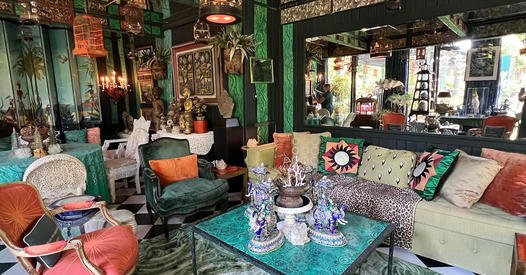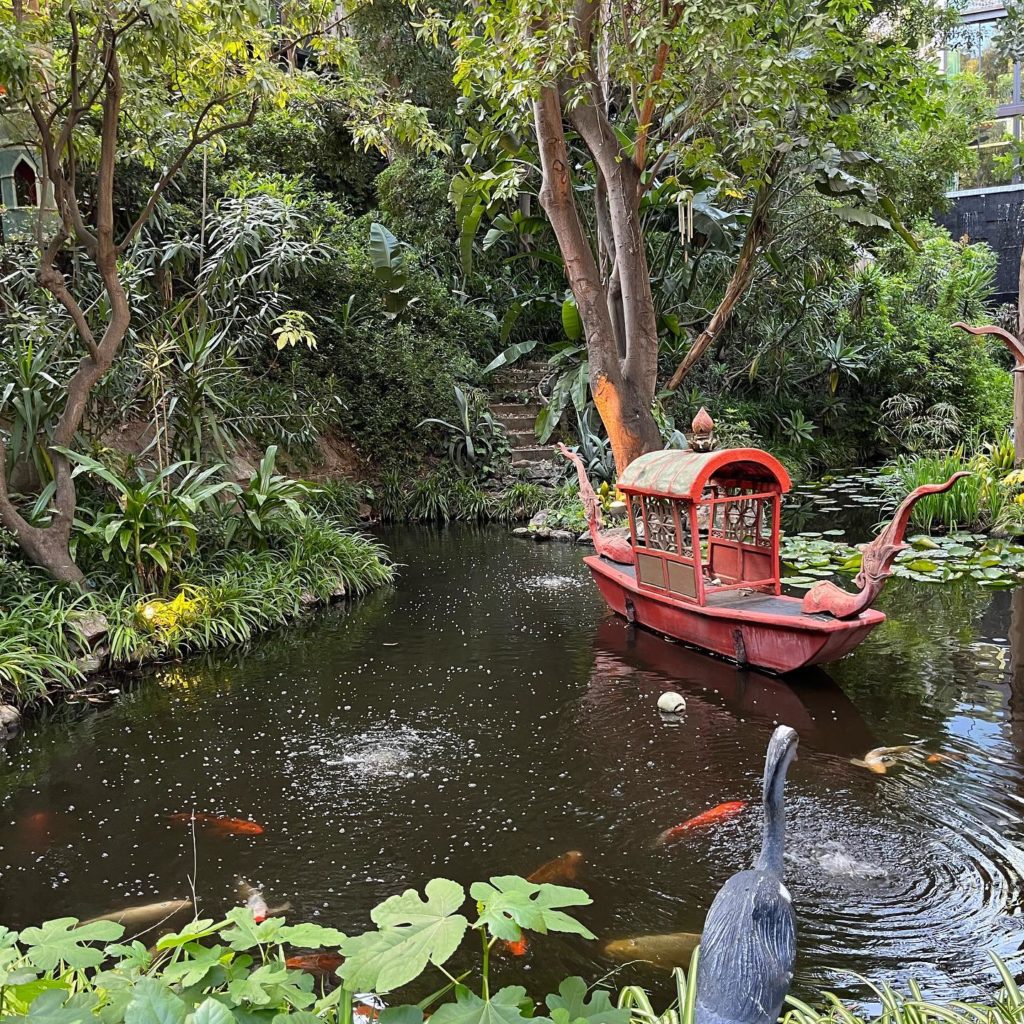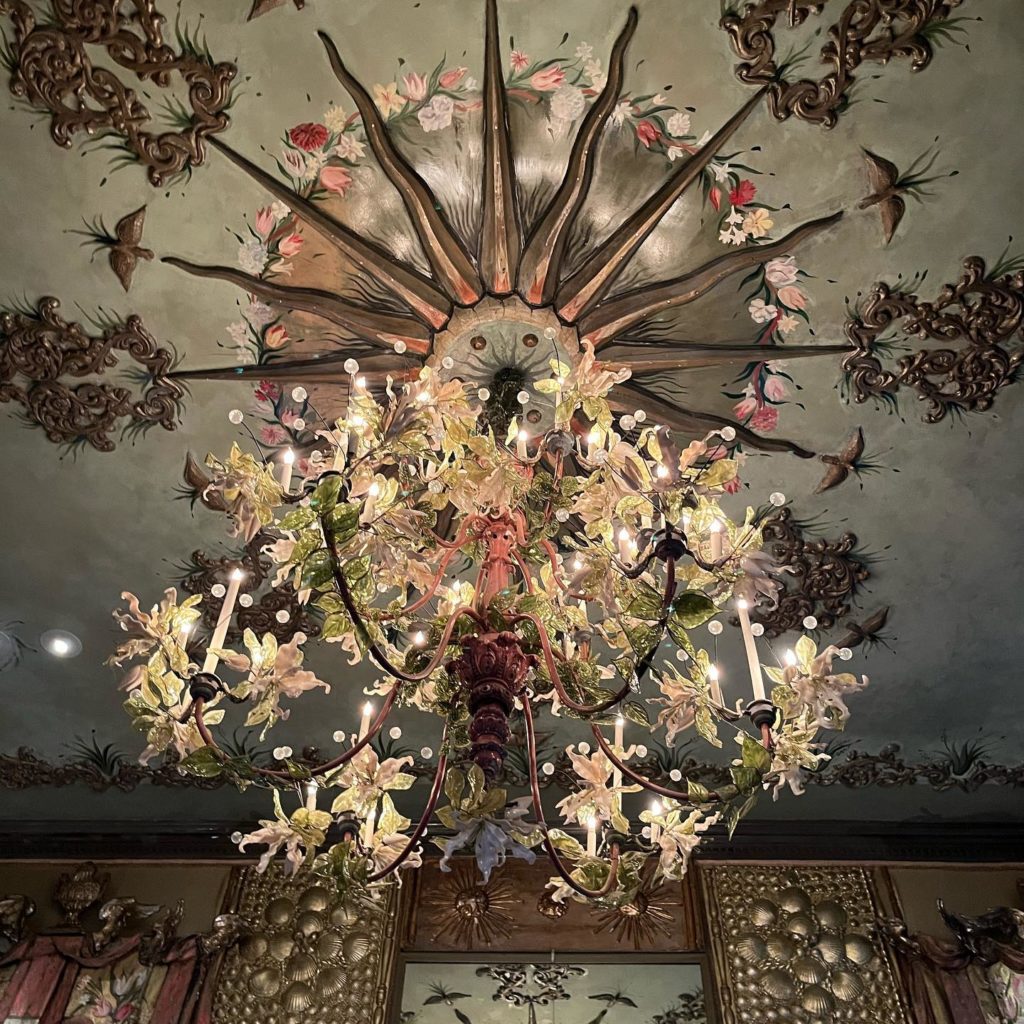
- calendar_month January 25, 2024
- folder Home Design & Decor
You don’t have to be a Hollywood insider to recognize the name Tony Duquette. Throughout the 1940s and ‘50s, he elevated set decoration to an art form with his “more is more” approach. It earned him a great deal of admirers, some well-positioned friends, and, it would seem, a small fortune. However, recent years have shown the majority of his wealth came from real estate. He had a knack for that too. And both his artistry and nose for a great deal met in a Beverly Hills home that he dubbed Dawnridge. It’s often been regarded as the most grandiose home in Beverly Hills. That’s really saying something, but it wasn’t always the case. Today, we take a closer look at one of the LA area’s most exotic and beloved homes: Tony Duquette’s Dawnridge.
The Dawn of Dawnridge
Photo credit: Samuel Lippke Studios
The mid-20th century is synonymous with the golden age of Hollywood. And few made those gilded ages gleam quite like Tony Duquette. His talents overflowed from the silver screen, spilling forth into residential design as well. In 1949, amidst this period of abundant creativity, the artist constructed a tiny home on a Beverly Hills plot. Duquette and his wife, Elizabeth (known by friends as “Beegle”), moved into this 900-square foot abode. And the ideas began to stack high all around it.
Tony Duquette’s Artistic Necromancy
Photo credit: Ray Barnhart
Much like a sculptor appreciating a block of clay or a painter surveying a blank canvas, Tony Duquette had an uncanny talent for finding potential in the discarded. His tastes were exotic, sure, but they didn’t veer too far out of the bounds of the traditional. He just knew how to achieve this effect in ways both innovative and affordable. For example, he would often craft his own ornate statues from wire before coating them in iron. He dissected oil drums and resurrected them in stunningly stately form.
Photo credit: Hollywood Unwrapped
Through Dawnridge, Tony Duquette became “Tony Abalone”, so dubbed for his penchant for incorporating abalone shells into his gardens. Twin sentinel obelisks, textured with crushed abalone shells, flank a chandelier with a disco ball nucleus. Likewise, plants reach for California skies from clamshell holders surrounding a treehouse pavilion populated by malachite-encrusted Palmer chairs.
It almost feels as if the world’s unappreciated treasures were pulled to Dawnridge to live out their properly exalted existences. Here are windows plucked from a Chinese home. There are the artfully repurposed remnants of a Victorian house. Across the terraces stacking to form Dawnridge, an exotic collection unfolds as filtered through the mind of Tony Duquette.
Photo credit: Ray Barnhart
A treehouse punctuates the grounds, its roof salvaged from the set of 1959’s The Gazebo. It’s just one of many movie props revitalized by Duquette’s vision. Yet, the real world remains inconspicuously at the outskirts in all its horror as metal landing strips that survived World War II ring the structure. Framed in such a way, it’s as if the artist has managed to strip the fangs from war itself. Cue the proverbial flower in the gun barrel.
The Found Gardens of Dawnridge
Photo credit: Ray Barnhart
Dawnridge may not be massive on a structural level. But it is surrounded by an impressive garden that adds an extra degree of lusciousness to the one-acre estate. Even the natural world became Duquette’s playground of found treasures. When ground broke on Dodgers Stadium at the beginning of the 1960s, Duquette employed a team to collect the discarded plant life of Chavez Ravine. Native pines, succulents, yucca, agapanthus, and cacti were “harvested”. Their future? New life in not just the gardens of Dawnridge but the Malibu ranch home owned by Tony Duquette. When the ranch eventually burned down, any surviving plants, including jade trees, were deposited in the Dawnridge gardens.
Photo credit: Ray Barnhart
Duquette’s commitment to his garden was particularly striking in contrast to the homes of his Beverly Hills neighbors. They were paving their grounds with swimming pools, tennis courts, and other amenities of the rich. Meanwhile, Duquette leaned into the tiered topography of his property. He was said to see his plants as yet another mode of creation; a means of painting his visions in varying verdant shades. He’d return from morning walks, arms overflowing with all manner of exotic vegetation, castaways of the wealthy’s gardeners. Fascinated by repeating patterns, a frequent theme in his art, Duquette sought to create beautiful Frankensteined creations from this botanical refuse.
Kaleidoscopic Vision
Photo credit: Samuel Lippke Studios
The gardens of Dawnridge are alive with more than flora both manipulated and wild. You’ll find the signature of Tony Duquette all over the grounds, not just in the decoration but the very orchestration of things. A Vietnamese wedding boat floats languidly atop the mirrored surface of a pond teeming with koi; a delicate watercolor in motion. Nearby stands a pavilion made more striking by its ornately carved Indian screens. It’s said that Duquette held a profound fascination with birdcages, regardless of whether or not they held avian life. It was the structure that so absorbed him; a unique delight that he explored in the many pavilions that pepper the Dawnridge property.
Photo credit: Ray Barnhart
It’s easy to get lost in the kaleidoscopic world of Dawnridge, but the Beverly Hills home that took the world’s refuse and turned it into something so wonderfully alien didn’t happen overnight. In fact, shortly after establishing the home, Tony and Beegle Duquette moved to Paris for a period, leaving Dawnridge a far cry from where we’d find it today.
The “Living Home”
Photo credit: Ray Barnhart
Go to Dawnridge today and you’d better have an invitation from Hutton Wilkinson, the home’s current owner. Wilkinson’s connection to Tony Duquette and, by extension, Dawnridge itself runs deep. The eccentric interior designer was business partners with Duquette, serving as CEO and creative director of the artist’s jewelry line. Upon Duquette’s passing in 1999, Wilkinson became president of Tony Duquette Inc., a globe-spanning company marrying interior design and fine jewelry with current projects in Palm Beach, New York, Paris, and, of course, Beverly Hills. He also became the land owner of Dawnridge which serves today as the headquarters for Tony Duquette Inc. Fearing that the home would simply be razed for its Beverly Hills plot, he purchased the property upon Duquette’s passing. Since then, he’s called Dawnridge home while continuing to manage the business that Duquette and he shared.
Photo credit: Hollywood Unwrapped
Part of this vision of a “living home” meant a commitment to stirring the waters so to speak. To satisfy the terms of Duquette’s Last Will, Wilkinson had to sell off most of Dawnridge’s antiques. Speaking with Architectural Digest in 2018, Wilkinson noted that Duquette and Beegle never displayed their own artwork at Dawnridge, though the couple didn’t clarify why. “I think he believed if he was surrounded by antiques, everyone would think he was rich,” Wilkinson recounted. “Well, he was rich! He made loads of money off of real estate.”
Dawnridge’s Continuing Evolution
Photo credit: Ray Barnhart
The daunting task of keeping Dawnridge a work of art in motion has kept Wilkinson busy. When the home next door burned down, he promptly bought the land. He used his own skills as Duquette’s protégé to bring new décor into the home, remaining true to the artist’s vision. He even purchased two more neighboring lots and the former home of an Italian diplomat with the idea of incorporating them into the Dawnridge grounds.
Photo credit: Samuel Lippke Studios
Every acquisition was (and continues to be) made with the overall concept of Dawnridge in mind; a residential sculpture that’s never quite complete. In 2009, Wilkinson declared that his creation of a much-needed pond as well as an Indian temple were his favorite contributions. And having worked closely with Tony Duquette since the age of 17, Wilkinson has spent his whole life developing an understanding of that aesthetic.
Photo credit: Hollywood Unwrapped
Since buying the property, Wilkinson has done what he can to keep Dawnridge feeling “alive.” This doesn’t just mean introducing new pieces of art, moving around décor, or continuing to run the business he shared with Duquette. It means hosting lavish parties, agreeing to rent the space for photo and film shoots, and doing whatever it takes to keep the home respected and admired in the public eye.
Photo credit: Hollywood Unwrapped
This was perhaps best executed in Wilkinson’s gorgeous 2018 book Dawnridge which provides the curious public with an inside look at the ornate home in breathtaking photos. The book also gave him an outlet to explore the numerous changes he’s incorporated into the ever-evolving property over the decades. And while Wilkinson holds an immediately apparent love for the home, he’ll be the first to tell you that managing the property isn’t all roses.
Breathing Life Into a Home
Photo credit: Hollywood Unwrapped
Chief among the hardships: Dawnridge is exceedingly expensive to maintain. He’s been looking to part with the property, but wants to sell to a party who would understand the import of its legacy. Ultimately, he’d love to see someone turn Dawnridge into a museum and open it up for public admiration once and for all.
Photo credit: Hollywood Unwrapped
It recalls an anecdote that Wilkinson shared in that same interview with Architectural Digest. In the story, Tony Duquette laments to a friend who happened to own the Bay Area’s Ghirardelli Square, “With all of my genius, the only thing that has made me money is my real estate” to which the friend replies, “That is your genius.”
Photo credit: Samuel Lippke Studios
It’s sad to think that Duquette would think his vision so underappreciated in his lifetime. But, perhaps through Wilkinson’s efforts, the artist will posthumously hit those heights as Dawnridge continues opening its doors to new faces and their accompanying imaginations.


